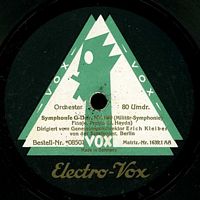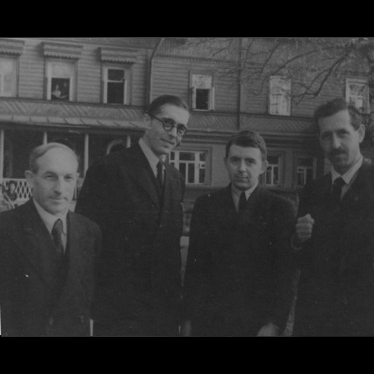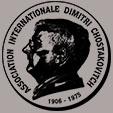Étiquette : Willi Boskovsky

A la demande amicale d’un habitué de ce blog / At the request of a friend of this blog:
Mozart Divertimento n°15 en si bémol majeur K.287 « Zweite Lodronische Nachtmusik »
Wiener Oktett: Willi Boskovsky, Violine I; Philipp Matheis, Violine II;
Günther Breitenbach, Bratsche; Johann Krump, Kontrabass;
Josef Veleba & Josef Lackner, Horn
Wien Musikverein Brahmssaal – 4-7 April 1955
Pr: Victor Olof & Peter Andry; Eng: Cyril Windebank
Source: 33t/LP: London LL 1239
Violon I: Willi Boskovsky (1908-1991) « Stimmführer » des Violons I de 1934 à 1938, puis Konzertmeister de 1938 à 1970; Violon I du Wiener Oktett de 1947 à 1959
Violon II: Philipp Matheis (1918-1975) « Stimmführer » des violons I de 1954 à 1958, puis de 1968 à 1974; Violon II du Wiener Oktett de 1947 à 1968
Alto: Günther Breitenbach (1911-1992) « Stimmführer » de 1958 à 1977; membre du Wiener Oktett de 1947 à 1972
Contrebasse: Johann Krump (1889-1974) « Stimmführer » de 1938 à 1951 Contrebasse solo de 1951 à 1955; membre du Wiener Oktett de 1947 à 1964
Cor I: Josef Veleba (1914-1997) Cor solo de 1940 à 1968; 3ème Cor de 1968 à 1971, puis 4ème Cor de 1971 à 1977; membre du Wiener Oktett de 1947 à 1967
Cor II: Josef Lackner (1908-1996) 4ème Cor de 1941 à 1942, puis 2ème Cor de 1942 à 1973
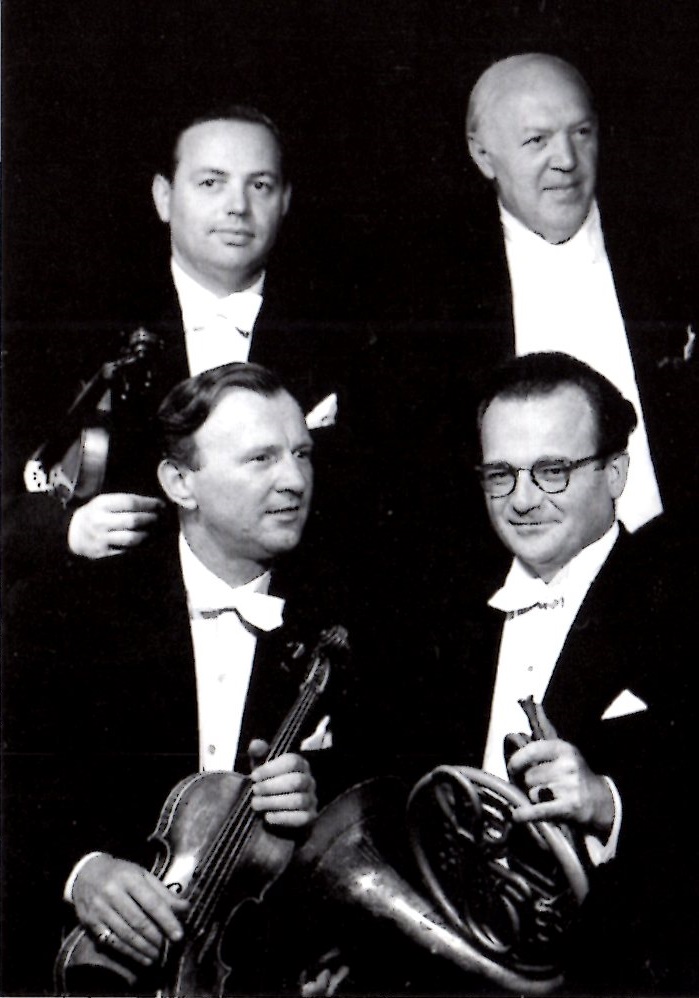
1er rang/First row: Willi Boskovsky & Josef Veleba / 2ème rang/Second row: Philipp Matheis & Johann Krump
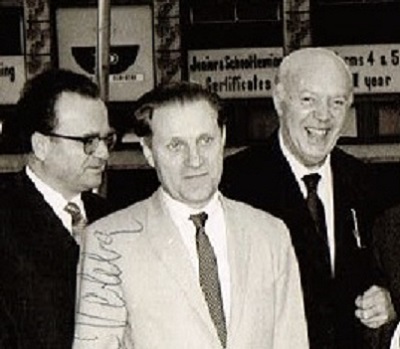
Josef Veleba, Günther Breitenbach & Johann Krump (Johannesburg 1962)
Ce Divertimento, écrit à l’origine pour un sextuor (2 violons, alto, contrebasse et 2 cors), est le plus souvent joué dans une version orchestrale, et bien qu’il en existe des enregistrements sous la baguette de chefs mozartiens reconnus (Walter, Toscanini, Karajan, Münchinger, Vegh etc…, sans oublier Willi Boskovsky et son Wiener Mozart Ensemble), la version de musique de chambre reste de loin préférable.
Et ici, son interprétation par des musiciens fondateurs en 1947 du Wiener Oktett, dans un style proche de la musique populaire, convient particulièrement à cette œuvre qui utilise deux thèmes favoris du public: « Heissa, hurtig, ich bin Hans » (« Allez, hop-là, je suis Hans ») dans l’Andante grazioso con Variazioni (II) et, avec beaucoup d’humour, « D’Bauerin hat d’Katz verlor’n » (« La fermière a perdu son chat ») dans le dernier mouvement (VI).
Si on parle beaucoup à propos de la musique de cette époque d’interprétations historiquement informées, il s’agit d’une logique musicologique qui, pour rigoureuse qu’elle soit, n’est pas forcément plus pertinente que la tradition d’interprétation issue en ligne directe de la musique populaire et illustrée ici par des musiciens du plus grand orchestre d’Autriche.
Cette version de 1955 qui n’existe qu’en mono a été publiée en 1956 à l’occasion du bi-centenaire de la naissance de Mozart (puis en 1957), mais, comme le Wiener Oktett a enregistré une nouvelle version stéréophonique en 1962 (avec comme premier violon Anton Fietz qui a succédé en 1959 à Willi Boskovsky), ces microsillons n’ont jamais été ré-édités. Les reprises ultérieures sont un CD paru au Japon en 1999 (POCL4638) et le double Album Decca Eloquence paru en 2011 (4804328).
La première tentative recensée d’une prise de son stéréophonique à Vienne par Decca a suivi immédiatement cet enregistrement. Il s’agit de l’ « Eroïca » de Beethoven avec le WPO sous la direction d’Erich Kleiber, captée à la Musikvereinsaal du 11 au 14 avril 1955, avec les mêmes producteurs et comme ingénieurs du son Cyril Windebank et Gil Went pour la mono, et Roy Wallace pour la stéréo. En raison du résultat jugé insatisfaisant, la bande stéréo a malheureusement été effacée.
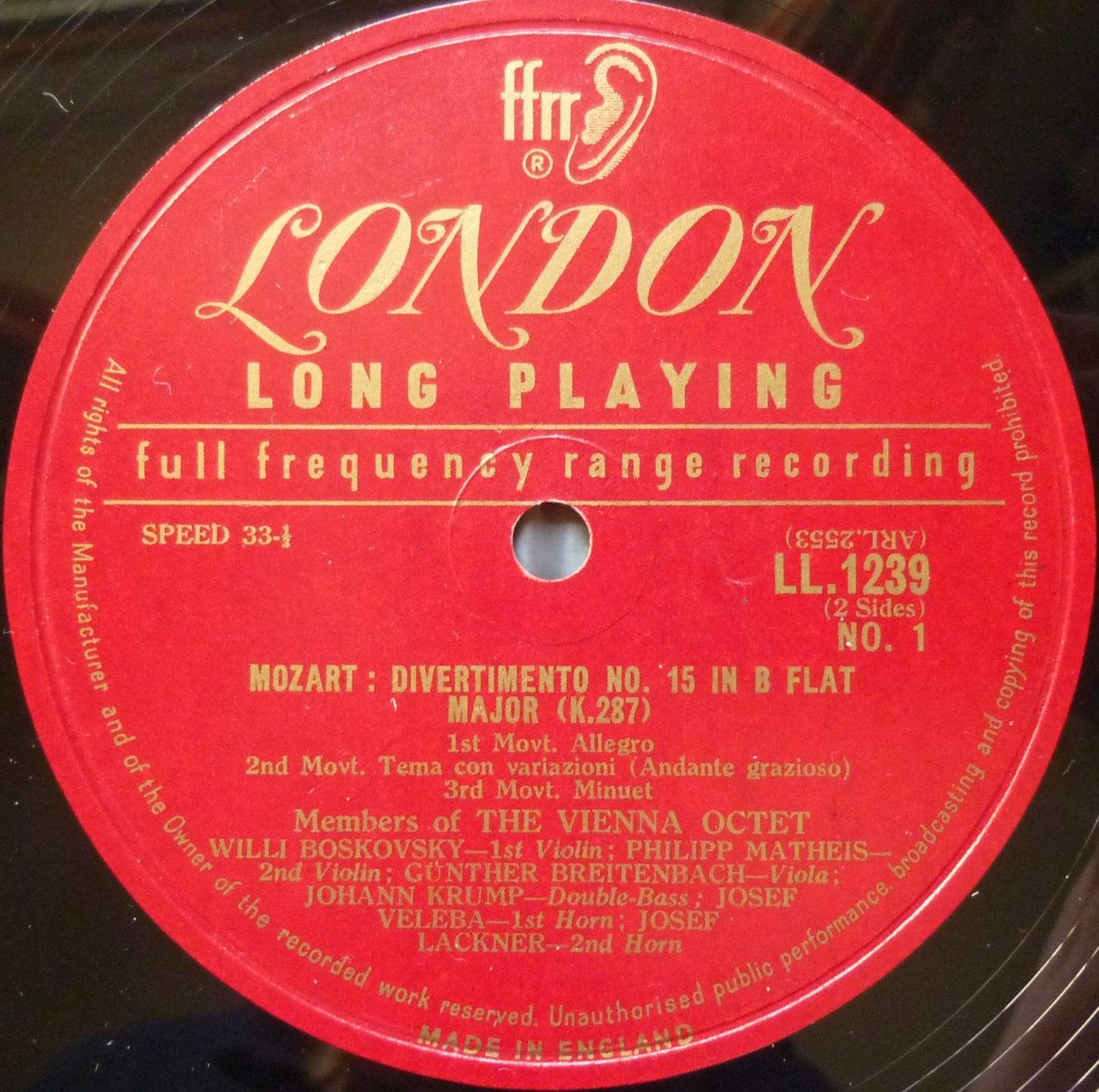
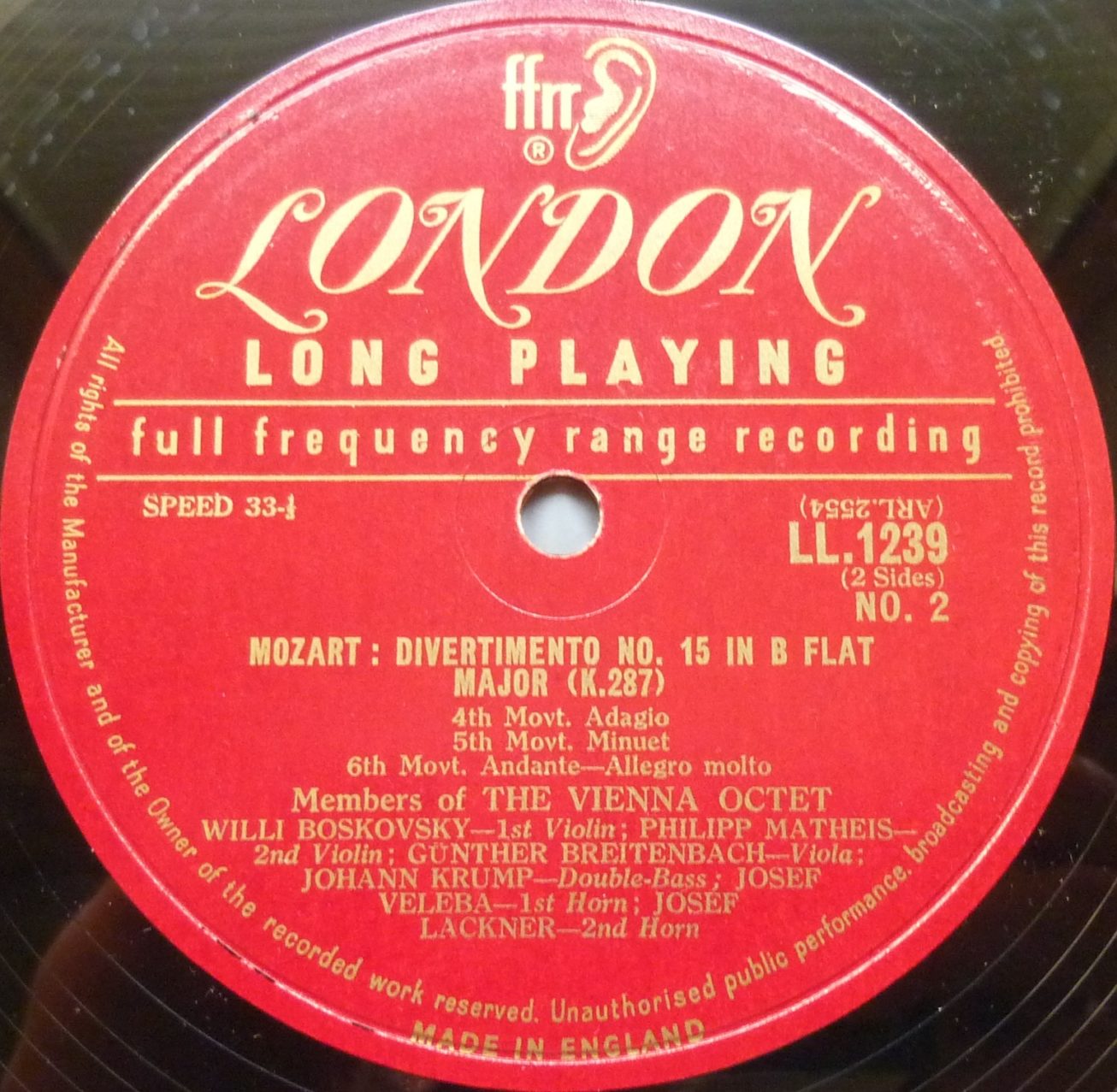
Mozart Divertimento n°15 in B flat major K.287 « Second Lodron Nightmusic »
Wiener Oktett: Willi Boskovsky, Violine I; Philipp Matheis, Violine II;
Günther Breitenbach, Bratsche; Johann Krump, Kontrabass;
Josef Veleba & Josef Lackner, Horn
Wien Musikverein Brahmssaal – 4-7 April 1955
Pr: Victor Olof & Peter Andry; Eng: Cyril Windebank
Source: 33t/LP: London LL 1239
Violin I: Willi Boskovsky (1908-1991) « Stimmführer » of Violins I from 1934 to 1938, then Konzertmeister from 1938 to 1970; Violin I of Wiener Oktett from 1947 to 1959
Violin II: Philipp Matheis (1918-1975) « Stimmführer » of Violins I from 1954 to 1958, then from 1968 to 1974; Violin II of Wiener Oktett from 1947 to 1968
Viola: Günther Breitenbach (1911-1992) « Stimmführer » from 1958 to 1977; member of Wiener Oktett from 1947 to 1972
Double-bass: Johann Krump (1889-1974) « Stimmführer » from 1938 to 1951, soloist from 1951 to 1955; member of Wiener Oktett from 1947 to 1964
Horn I: Josef Veleba (1914-1997) solo Horn from 1940 to 1968; 3rd Horn from 1968 to 1971, then 4th Horn from 1971 to 1977; member of Wiener Oktett from 1947 to 1967
Horn II: Josef Lackner (1908-1996) 4th Horn from 1941 to 1942, then 2nd Horn from 1942 to 1973
This Divertimento, originally written as a Sextet (2 violins, viola, double-bass and 2 horns), is generally performed in its orchestral version, and although it has ben recorded by notable mozartian conductors (Walter, Toscanini, Karajan, Münchinger, Vegh etc…, without forgetting Willi Boskovsky and his Wiener Mozart Ensemble), the chamber music version remains by far preferable.
And here, its performance by founding members in 1947 of the Wiener Oktett, in a style close to popular music is especially relevant for this work using two folk songs: « Heissa, hurtig, ich bin Hans » (« Hello, go on, I am Hans ») in the Andante grazioso con Variazioni (II) and, with much fun, « D’Bauerin hat d’Katz verlor’n » (« The farmer has lost her cat ») in the last movement (VI).
If much is said about historically informed performances concerning music of that period, this has to do with a musicological approach, which though serious-minded, is not necessarily more relevant than the performing tradition directly coming from popular music and illustrated here by musicians of the greatest orchestra in Austria.
This 1955 version which exists only in mono was published in 1956 for the Mozart year (and also in 1957), but, as the Wiener Oktett recorded a new stereophonic version in 1962 (with as Violin I Anton Fietz who replaced Willi Boskovsky in 1959), these LPs have never been re-issued. The later publications are a CD published in Japan in 1999 (POCL4638) and the 2-CD Album « Decca Eloquence » published in 2011 (4804328).
The first attempt by Decca in Vienna of a stereophonic recording came immediately after this recording. It was Beethoven’s « Eroïca » with the WPO conducted by Erich Kleiber, at the Musikvereinsaal between April 11 to 14, 1955, with the same producers and as recording engineers Cyril Windebank et Gil Went for mono, and Roy Wallace for stereo. However, since the result was considered as being insufficient, the stereo tape has been unfortunately erased.

